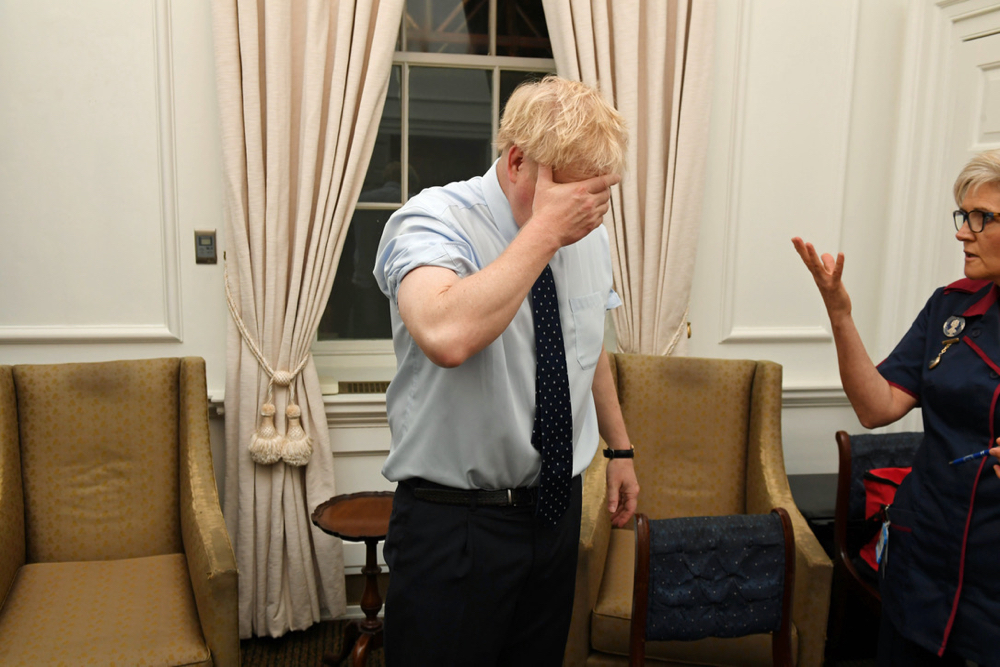Through the smoke of battle, it is becoming clear that Boris has bottled it. He has blinked first. That which was supposed to put maximum pressure on the European Union – the fear of the United Kingdom leaving it without an agreement – has rebounded, putting maximum pressure on him instead. All the signs suggest that the Government is about to do what it has always sworn it will never do, namely to leave part of the UK, Northern Ireland, within the EU customs union (perhaps with the fig-leaf of a name change, a Customs Arrangement perhaps).
When we start to see articles in the Daily Telegraph telling us that the Democratic Unionist Party, representing the hardline Unionist interest, must not be allowed to block the UK from following the national interest; indeed when we start to read articles in that paper explaining that the annual cost of keeping Northern Ireland inside the United Kingdom is actually more than the cost of keeping the UK inside the EU, then the writing is indeed on the wall. And it does not say: "No Surrender," like a mural on a Shankill gable end. It says: "Give us a deal."
The single most important reason why this change has unexpectedly appeared is the reaction of the Northern Ireland business community to Mr Johnson's previous package of proposals. Business leaders in the province lean naturally towards the Unionist cause, which makes their extreme consternation all the more influential. Many of them have spent 40 years building a business on the basis of an all-Ireland economy, with free movement of goods between north and south.
Suddenly they realise, or their bank managers do, that many of their business plans are unworkable in the event of Northern Ireland leaving the EU customs union, requiring a border between north and south. And it does not make a lot of difference whether that border is a virtual one, administered electronically, as Mr Johnson proposed, or a physical one with border posts, barbed wire and watch towers.
So far the opposition to a physical border has been largely based on the fear that watch towers and customs posts will attract terrorists, who will want to blow them up. But physical or virtual, the border will damage businesses equally, attracting agents of the Official Receiver rather than terrorists. Borders are where tariffs are collected, which not only eats into profit margins but involves extra administration, which could be expensive. The threat of bankruptcy to hitherto successful and respectable businesses is a powerful argument.
We are moving, therefore, towards the concept of a customs border in the Irish Sea, between Northern Ireland and the rest of the UK. Mr Johnson has raised the issue of democratic consent, but relying on a vote at Stormont presupposes that the Northern Ireland Assembly and power sharing Executive could both be revived. And even if it could be, either side would have a veto, as decisions have to be agreed by representatives of both communities. So rather than hand the DUP a veto, thereby giving it the power to hold not only the UK but the entire EU to ransom, the most likely outcome is a Northern Ireland referendum.
But this is where the Government will find it has opened a can of democratic worms. If Northern Ireland is allowed to vote on whether to stay inside the EU customs union, whatever it is called, why cannot the people of Scotland do the same? And what about England and Wales? Indeed, how could such referendums be limited to the one issue of customs, with or without regulatory alignment with the Single Market? Does this not almost automatically open the issue of EU membership in general, which a majority voted for in Scotland and Northern Ireland in 2016?
Let us suppose that despite all this jiggery pokery, either the EU or the Westminster Parliament, or both, reject whatever compromise Mr Johnson has arrived at, even if he has the support of his own party. If he really can no longer bear the thought of leaving without a deal, which he has so thoughtlessly proposed as a weapon of persuasion in the past, what options will be left to him? A national referendum seeking approval of his new, but now rejected, deal would offer him about the only way out.
He may want to shape the referendum legislation so as to offer a choice, between his deal or no deal. But it would inevitably be amended by the House of Commons to offer "Remain in the EU" as well. And Remain would win. Would Boris Johnson really care, if it did?



 Loading ...
Loading ...
What do you think?
You can post as a subscriber user ...
User comments (0)